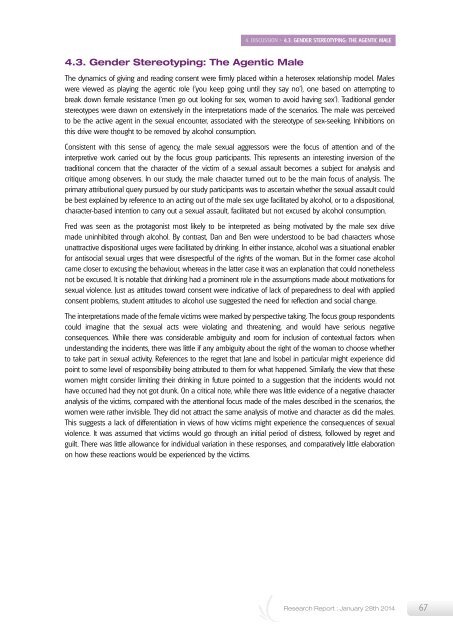Whats-Consent-Full-A41
Whats-Consent-Full-A41
Whats-Consent-Full-A41
You also want an ePaper? Increase the reach of your titles
YUMPU automatically turns print PDFs into web optimized ePapers that Google loves.
4. Discussion > 4.3. Gender Stereotyping: The Agentic Male4.3. Gender Stereotyping: The Agentic MaleThe dynamics of giving and reading consent were firmly placed within a heterosex relationship model. Maleswere viewed as playing the agentic role (‘you keep going until they say no’), one based on attempting tobreak down female resistance (‘men go out looking for sex, women to avoid having sex’). Traditional genderstereotypes were drawn on extensively in the interpretations made of the scenarios. The male was perceivedto be the active agent in the sexual encounter, associated with the stereotype of sex-seeking. Inhibitions onthis drive were thought to be removed by alcohol consumption.Consistent with this sense of agency, the male sexual aggressors were the focus of attention and of theinterpretive work carried out by the focus group participants. This represents an interesting inversion of thetraditional concern that the character of the victim of a sexual assault becomes a subject for analysis andcritique among observers. In our study, the male character turned out to be the main focus of analysis. Theprimary attributional query pursued by our study participants was to ascertain whether the sexual assault couldbe best explained by reference to an acting out of the male sex urge facilitated by alcohol, or to a dispositional,character-based intention to carry out a sexual assault, facilitated but not excused by alcohol consumption.Fred was seen as the protagonist most likely to be interpreted as being motivated by the male sex drivemade uninhibited through alcohol. By contrast, Dan and Ben were understood to be bad characters whoseunattractive dispositional urges were facilitated by drinking. In either instance, alcohol was a situational enablerfor antisocial sexual urges that were disrespectful of the rights of the woman. But in the former case alcoholcame closer to excusing the behaviour, whereas in the latter case it was an explanation that could nonethelessnot be excused. It is notable that drinking had a prominent role in the assumptions made about motivations forsexual violence. Just as attitudes toward consent were indicative of lack of preparedness to deal with appliedconsent problems, student attitudes to alcohol use suggested the need for reflection and social change.The interpretations made of the female victims were marked by perspective taking. The focus group respondentscould imagine that the sexual acts were violating and threatening, and would have serious negativeconsequences. While there was considerable ambiguity and room for inclusion of contextual factors whenunderstanding the incidents, there was little if any ambiguity about the right of the woman to choose whetherto take part in sexual activity. References to the regret that Jane and Isobel in particular might experience didpoint to some level of responsibility being attributed to them for what happened. Similarly, the view that thesewomen might consider limiting their drinking in future pointed to a suggestion that the incidents would nothave occurred had they not got drunk. On a critical note, while there was little evidence of a negative characteranalysis of the victims, compared with the attentional focus made of the males described in the scenarios, thewomen were rather invisible. They did not attract the same analysis of motive and character as did the males.This suggests a lack of differentiation in views of how victims might experience the consequences of sexualviolence. It was assumed that victims would go through an initial period of distress, followed by regret andguilt. There was little allowance for individual variation in these responses, and comparatively little elaborationon how these reactions would be experienced by the victims.Research Report : January 28th 201467


